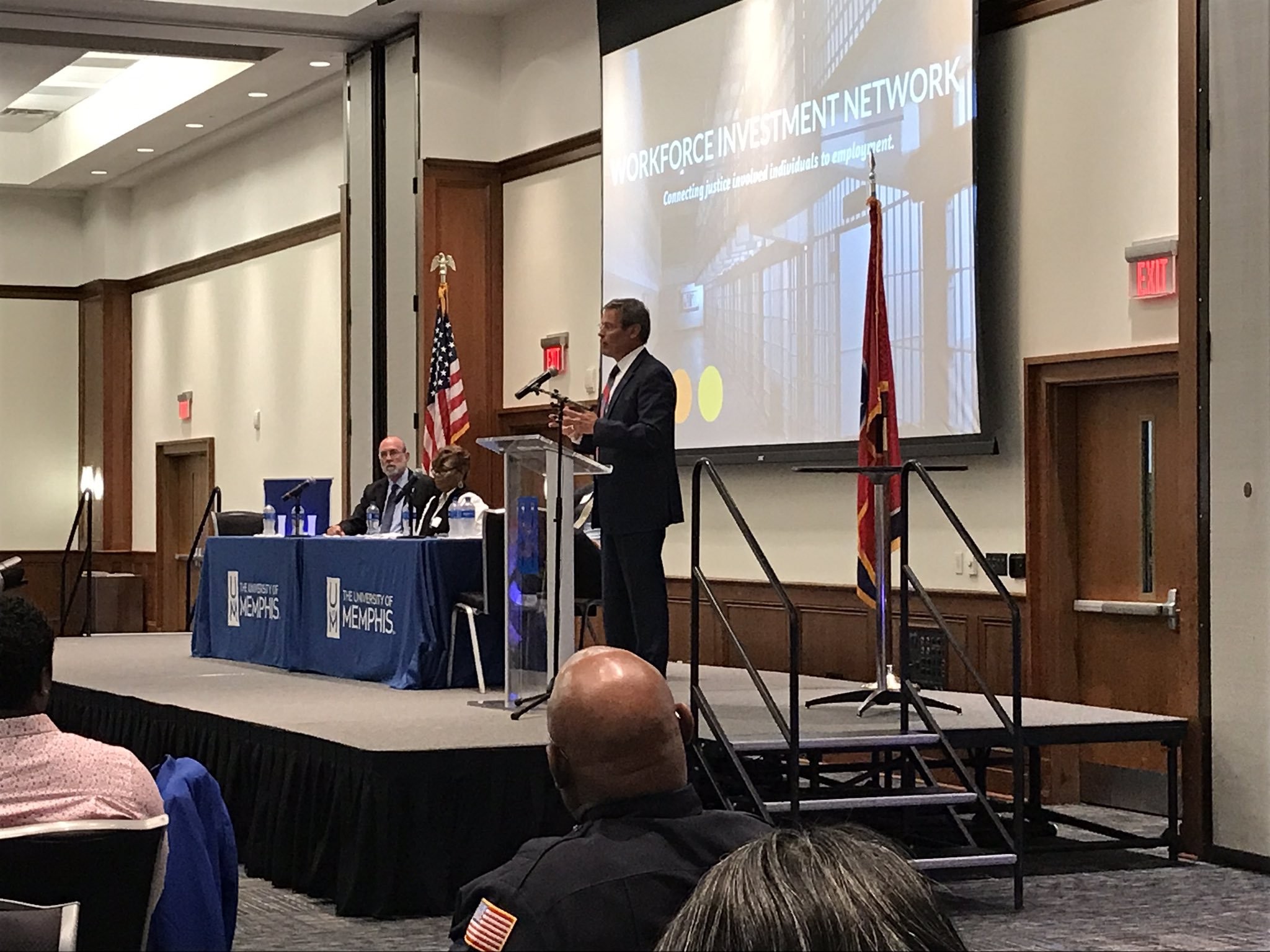
Gov. Bill Lee speaks about helping ex-offenders find employment.
Officials gathered at the University of Memphis Tuesday to discuss the importance of helping those who’ve been incarcerated find employment.
The forum, organized by the Memphis Shelby County Crime Commission, the Public Safety Institute at the University of Memphis, the Greater Memphis Chamber, and the Tennessee Department of Corrections, was meant to help local employers connect with and hire ex-offenders.
Local employers heard from local and state officials, law enforcement, and organizations that assist in reentry through skills training, education, and support.
Tennessee Gov. Bill Lee, who was at the forum, said that the way that the government assists formerly incarcerated individuals in the re-entry process has been a “long-time passion” of his. Lee said his administration has “made a strong commitment to the whole idea of criminal justice reform.”
Fifty percent of recently incarcerated men in the state commit another crime within the first three years of being released, and as a result return to prison, Lee said.
“The cost of doing nothing isn’t zero,” Lee said. “Victims pay the price. Families pay the price. Taxpayers pay the price. And there is a tremendous human costs added to all of that.”
Lee said his administration has a role to play, but “as much as state government can do, government is not the answer to solving the issues we face in society. It’s not the answer to criminal justice reform. ”
One of the other key players in the process of reentry is the private sector, Lee said. Without the private sector’s involvement, “we’re never going to get where we need to be.”
“Part of being tough on crime and smart on crime is finding ways for those who come out find meaningful employment and that’s what today’s about,” Lee said.
Lee, who said he’s “had a long history” with reentry efforts, was involved in a prison reentry program about 20 years ago, where he mentored men coming out of prison who were going back into society.
Through that, the governor said he learned how important the re-entry process is in reducing recidivism. “If we really want to reduce crime, then we need to reduce recidivism and one of the ways we do that is to strengthen our re-entry programs.”
“When we make re-entry more successful, we save taxpayers’ money because we lower the recidivism rate and ultimately lower the crime rate. We enhance workforce development through creating skilled workers. The key is connecting employers with those that are coming out and breaking down the stigma, making them understand that it’s a real opportunity for them.”
[pullquote-1]
Still, Lee said he believes that “we need to be tough on crime.”
“We need to be tough on violent offenders and crack down on those that are a threat to society,” Lee said. “We can do that and at the same time be smart in recognizing that once people have paid their penalty, they are coming out.
This is not a matter of being soft on those who are incarcerated. This is about those that are coming out and how it is that we make them successful in their re-entry so they don’t recommit a crime and have another victim and another taxpayer expense.”
Memphis Mayor Jim Strickland was also at the symposium Tuesday. Like the governor, Strickland said since he was elected into office in 2016, one of his priorities has been reducing recidivism and helping ex-offenders get back on their feet.
“The importance of what we’re doing today cannot be understated,” Strickland said. “A big part of life is forgiveness, second chances, and lending a helping hand to those in need when and where we can. I’m a firm believer that what we’re working on here today will have a long-lasting impact on every neighborhood in our city.”
Strickland said helping those who’ve been incarcerated find better opportunities through employment will ultimately lower the crime rate and improve the greater Memphis economy.
This discussion comes the same day Lee ceremonially signed a bill into law that eliminates the $180 expungement fees for people with certain criminal charges to have their records cleared.
Lee officially signed the bill in May and it will take effect July 1st. Two years ago, former Tennessee Gov. Bill Haslam halved the fee from $360 to $180.
Lee said the latest measure is another effort to remove the barriers formerly-incarcerated Tennesseans face upon re-entry and help them find employment.
“We need to remove those obstacles for those who’ve served their sentences and paid the price for their crime,” Lee said. “We need to remove obstacles to make it easier for them to re-enter.”
I think anything we can do to remove a barrier for someone who has re-entered or in the process of working, trying to get their feet back under them, trying to be a taxpayer, instead of a tax taker, we improve their success rate and expungement fee reductions will improve that process.”